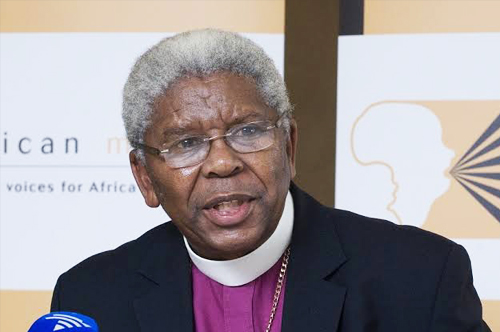Archbishop Njongo Ndungane
Born on 2 April 1941 in Kokstad, Archbishop Njongonkulu Ndungane was raised in a Christian household grounded in both discipline and compassion. His name—chosen by his grandfather—means “aim and vision,” a prophetic reflection of a life dedicated to justice, reconciliation, and public service.
As a student at the University of Cape Town, Ndungane joined the anti-pass law demonstrations in March 1960. In August 1963, he was sentenced to three years’ imprisonment on Robben Island for his activism. Upon his release, he was placed under a banning order—an apartheid-era restriction limiting where he could live, who he could associate with, and prohibiting him from public speaking, publishing, or attending meetings. These measures were designed to silence dissenting voices, but Ndungane’s commitment to justice endured.
In the post-apartheid era, Archbishop Ndungane emerged as a leading advocate for global justice and development. He played a pivotal role in the Jubilee 2000 Campaign, calling for the cancellation of odious debt owed by developing countries. He also joined various coalitions focused on poverty eradication and HIV/AIDS, championing the causes of health equity and economic justice across Africa.
A tireless advocate for the integration of faith in development, Ndungane urged religious communities to embrace the United Nations’ Millennium Development Goals (MDGs) as a moral and spiritual imperative. In the early 2000s, he began mobilizing churches to confront issues of poverty, trade inequality, and the HIV/AIDS crisis. Though initially met with resistance, he remained resolute, encouraging faith leaders to see development as an extension of their spiritual mission.
A significant moment came in 2005, when global leaders at the G8 Summit in Gleneagles pledged to double aid to Africa. That same year, Ndungane joined Kofi Annan and Jeffrey Sachs as a keynote speaker at St Paul’s Cathedral in London, as part of the series on poverty titled What Can One Person Do?
In 2006, he founded African Monitor, which was established to hold governments and development partners accountable for their pledges. With a focus on MDG 8—developing global partnerships—African Monitor also addressed issues of food security (MDG 1) and public health (MDG 4). Under Ndungane’s leadership, the organization launched initiatives such as the Development Support Monitor, grassroots capacity-building programs, and continent-wide poverty hearings. These projects amplified the voices of marginalized communities—especially women and youth—and promoted locally driven solutions.
Inspired by the philosophy of economist Amartya Sen, Ndungane believed that true development enhances people’s capabilities to shape their own futures. This belief shaped campaigns like Voice Africa’s Future, which engaged youth in ten African countries to influence the post-2015 development agenda.
African Monitor quickly gained recognition in the global development space, serving as the Secretariat for the Africa CSO Working Group and representing grassroots perspectives at major international forums, including the UN High-Level Panel consultations and the World Economic Forum.
After nearly two decades at the helm, Archbishop Ndungane stepped down as Chair of African Monitor in 2024. He was succeeded by Rev Ndaba Mazabane, ensuring that the mission of amplifying grassroots voices continues with vigour and vision.
Archbishop Ndungane has been widely recognized for his leadership, advocacy, and service:
Honorary Degrees:
- Doctor of Divinity, Rhodes University (1997)
- Doctor of Divinity, Protestant Episcopal Seminary, Virginia (2000)
- Doctor of Humane Letters, Worcester State College, Massachusetts (2000)
- Doctor of Social Science, University of Natal (2001)
- Doctor of Philosophy, University of Cape Town (2003)
- Doctor of Theology, University of Stellenbosch (2005)
- Doctor of Divinity, Episcopal Divinity School, Cambridge, Massachusetts (2007)
- Doctor of Literature and Philosophy, UNISA (2008)
- Doctor of Technology (Human Sciences), Vaal University of Technology (2008)
Awards:
- Fellow of Kings College London (1979)
- Order of the Baobab in Silver (2008)
- Freedom of the City of Cape Town (2016)
- Robben Island Alumnus Award (2024)
Selected Publications
- Primate Speaks Out on Debt and Arms. Anglican Communion Office, 1997.
- Oppression, Faith and the Future: The Archbishop of Cape Town. Great St Mary’s, 1997.
- Addresses at “Local Communities, Global Realities” Conference, Toronto. 1999.
- A World with a Human Face: A Voice from Africa. David Philip, 2003. ISBN 978-0-86486-614-1
- “Don’t Cut Aid to Africa Now.” The Guardian, 2009.


